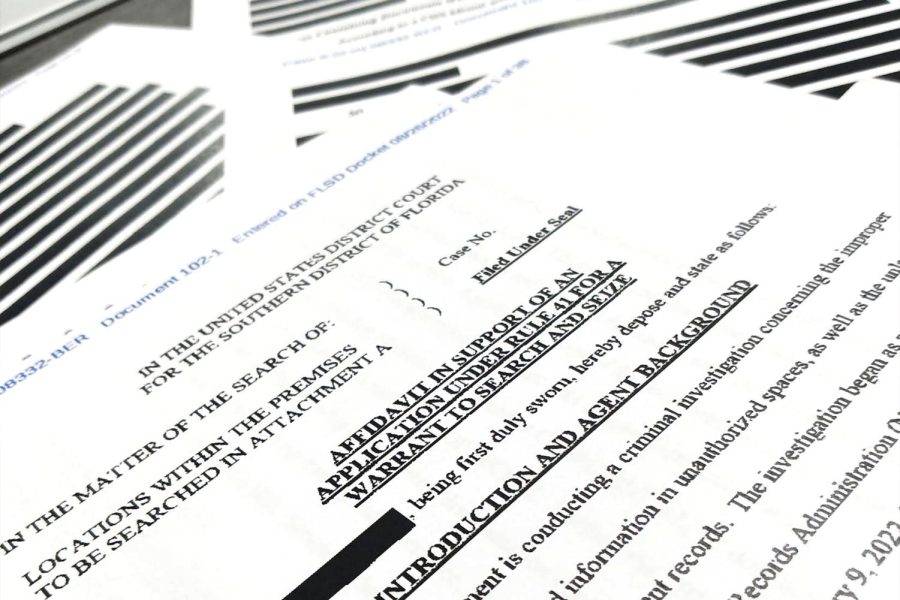Trump under investigation for potential Espionage Act violations
Trump possessed highly classified material prior and during Mar-a-Lago search, affidavit reveals
The affidavit, released by the Department of Justice on Friday, revealed that the former president was being investigated for possible violations of the Espionage Act, in addition to other crimes.
August 30, 2022
A redacted version of the affidavit — written statement under oath — used to obtain a search warrant for former President Donald Trump’s Mar-a-Lago property was made public on Friday. It reveals that before the search, Trump had 184 classified U.S. documents at the premises; 67 confidential, 92 secret and 25 top secret.
Secret and top secret documents can result in serious to exceptionally grave damage to national security if disclosed, claims the affidavit.
Read the affidavit
The National Archives and Records Administration claimed the documents had been missing for nearly a year. In January, NARA received 15 boxes of documents from Trump after ongoing conversations with his representatives.
A preliminary triage of the boxes in February revealed the 184 classified documents, and NARA sent a referral to the Department of Justice. The FBI launched a criminal investigation “concerning the improper removal and storage of classified documents in unauthorized spaces” and “unlawful concealment or removal of records.”
On Aug. 5, the FBI obtained a search warrant for Mar-a-Lago on the probable cause that “the locations to be searched at the premises contain evidence, contraband, fruits of crime, or other items illegally possessed in violation of [the Espionage Act].”
With the search, the FBI wanted to determine how classified documents were removed from their locations; whether Mar-a-Lago was an authorized location for classified documents; and identify persons who might have removed the documents, claims the affidavit.
On Aug. 8, for nine hours, the FBI searched “the ‘45 Office,’ all storage rooms, and all other rooms or areas within [Mar-a-Lago] used by FPOTUS and his staff in which boxes or documents could be stored … ” according to the search warrant.
Items seized include “info re: President of France,” “Miscellaneous Secret Documents,” “Miscellaneous Confidential Documents,” “Miscellaneous Top Secret Documents,” 22 boxes and handwritten notes.
The affiant — FBI agent specializing in espionage who swore to the affidavit — claimed handwritten notes could point to obstruction of documents, an Espionage Act violation.
Following the search, Trump issued a statement where he claimed the search was unnecessary and deemed it a “witch hunt.”
“It is prosecutorial misconduct, the weaponization of the Justice System, and an attack by Radical Left Democrats who desperately don’t want me to run for President in 2024,” he wrote.
He added, “Such an assault could only take place in broken, Third-World Countries. Sadly America has now become one of those countries, corrupt at a level not seen before.”
Via electronic mail, Trump’s lawyer, Evan Concoran, replied to the DOJ’s investigation defending Trump’s possession of classified documents, reveals the affidavit.
“Under the U.S. Constitution, the President is vested with the highest level of authority when it comes to the classification and declassification of documents,” Concoran wrote, referencing Navy v. Egan, a case interpreted to support presidential authority over national security.
On Aug. 22, Trump filed a lawsuit requesting a special master — official overseeing a case — be appointed to the investigation. He also asked for the DOJ to stop reviewing seized Mar-a-Lago items until a special master is appointed.
As of Aug. 29, no appointed special master is working on the case; however, Florida District Judge Aileen Cannon said it was her “preliminary intent” to assign one. The DOJ reported that a review team went through seized materials prior to Trump’s Aug. 22 request.











